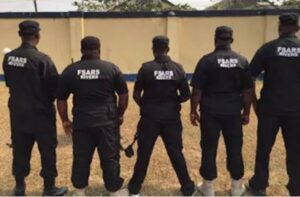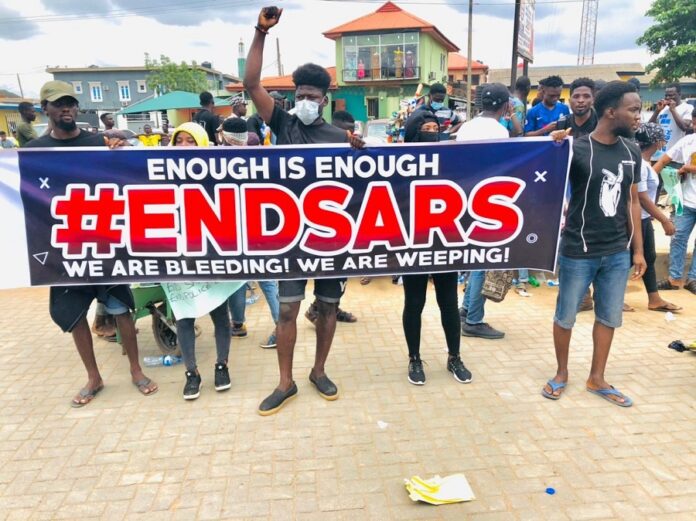In October, a video of the police shooting a man outside of the Wetland hotel in Ughelli, a town in Delta State Nigeria, circulated on Twitter. In the video, the police stole the man’s car after the shooting.
The police in the video did not wear any special uniform. They were part of a special unit called the Special Anti-Robbery Squad, or SARS. SARS has a notorious reputation in Nigeria as being violent and corrupt.
After the circulation of the video, the hashtag, #ENDSARS trended on Twitter. As a result of the video, the person who posted the video was arrested.
The video and subsequent arrest provoked mass anger. Thousands of protesters took to the street to end SARS. While the Nigerian state has agreed to end the SARS program, it also has cracked down on the protests. Dissenting voices in Nigeria have accused the state of repackaging SARS and pushing draconian bills to prevent future protests.
History
Before being colonized by the British, Nigeria was covered by a collection of smaller kingdoms. For Nigeria, colonial rule was indirect, through the Royal Niger Company. Local leaders were allowed to remain as long as they facilitated the British trade interest. When Nigeria became independent, it had a large military that was designed to control rather than serve the local population. As a result, much of Nigeria’s post-colonial governments have been under the control of the military. Sporadic civilian governments have come up, only to be retaken by the military, until 1998, when the current civilian government was established following the mysterious death of the then leader Sani Abacha.
Begining of SARS

SARS was founded during Abacha’s rein in 1992, after Col. Isreal Rindam, a military officer was killed by police officers. The killing of Rindam led to the army coming against the police. The army reprisal meant that police feared coming into the open. The open humiliation of the police by the army led to a sudden disappearance of the police in Nigeria. Police who continued to operate in public view risked reprisal from the military.
The police commissioner, Simeon Danladi Midenda, Midenda created SARS, initially only 15 officers, to operate clandestinely, in civilian clothes and without marked police vehicles. This was to ensure that they would not be molested by the army and could continue to operate.
SARS continued operation as a police unit. As SARS began to grow, stories of police corruption, violence, and theft became common. SARS was seen as a corrupt force that harassed young people. SARS officers acted with impunity. SARS officers would conduct encounter killings, extortion, car stealing, cattle rustling, and other forms of harassment on the civilian population.
Begining of online resistance
In 2016, online campaigns began against SARS, leading to the growth of a movement. The hashtag #ENDSARS gained support. Many prominent Nigerian personalities supported the ending of SARS. Though the movement against SARS grew, street protests remained localized.
During the COVID pandemic, Nigeria had a lockdown from March until September 2020. The economy was already struggling before the pandemic, but due to the lockdown, unemployment and social frustration grew. When the Wetland Hotel shooting video circulated, it led to a revival of the protest and an outpouring onto the streets. Other reports of similar encounter killings fueled the protests.
Aftermath
The State initially tried to dismiss the protesters as criminal elements and violently suppressed the peaceful demonstrations. As the protests grew, the state then tried to stop the protests through a combination of suppression and appeasement.
The state agreed to abolish SARS and reassign police working in SARS to other units under local control. There were even talks of compensation packages for those affected by atrocities committed by SARS.
At the same time, the state declared a curfew on 20th October to prevent future protesting. On the day curfew started, the military began to clear people from the streets hours before the declared time and even fired as civilians. The state reports that 2 people died because of the firing, though protesters have counted 15 people dead as a result of the firing. Due to the crackdown, information is hard to get. The firings are now being called the Lekki Gate Massacre.
Fighting “Fake News”
The State also tried to make sharing videos, like the one that initiated the protests, illegal, with the Protection From the Internet Falsehoods and Manipulation Bill. The state claims this bill will prevent any sharing of “fake news,” which will lead to the maligning of the state and the police. This bill punishes those who have violated the bill with up to 3 years in prison.
The State also has formed another police unit called the Special Weapons and Tactics teams, or SWAT teams, which protesters say are just a repackaged SARS.
The state also froze the bank accounts of many protesters.
Protests revived
The #ENDSARS protests have been compared to many other protests to end police brutality in the American continent. Nigerians complain that the undercover nature of SARS agents makes them feel unsafe in their own communities. The power they have as police gives them dangerous levels of impunity, and breeds all forms of corruption, even in the democratic state of Nigeria. At the same time, the unwillingness of the state to rein in SARS shows how police impunity is supported by the state. When reforms on the police give the police more power, it requires a lot of effort and pain on the part of the people to bring it back.
The author is a mathematician and political observer based in Bangalore



